Jupiter Farms Citrus History: Riverbend Park's Roots
![]() 8 min read
8 min read
Jupiter Farms, nestled in the heart of Palm Beach County, Florida, is a land rich in history and natural beauty. Known for its lush landscapes and rich soil, it has a long history of citrus farming, which played a pivotal role in shaping the community and its surroundings. As we explore the early history of Jupiter Farms, we also look forward to the 10th Annual Wild & Scenic Film Festival at the Jupiter Inlet Lighthouse & Museum. This exciting event, celebrating our natural world and the efforts to protect it, echoes the historical connection between the Jupiter community and its natural environment.
Jupiter Farms' Citrus Legacy
Jupiter Farms’ journey into becoming a cornerstone of Florida’s citrus industry began with a man named Augustus “Sawgrass” Miller. Almost nothing is known about Sawgrass Miller other than the property purchase that made him one of the earliest known citrus growers in the Riverbend Park area. Sawgrass Miller purchased his property directly from the State of Florida in 1882; he established several citrus groves in the earliest years of pioneer settlement. Miller’s ambition laid the groundwork for a thriving citrus economy that would define the area for decades to come.
Potter, Brelsford, & Lainhart Groves
The story of Jupiter Farms’ citrus legacy deepens with the entry of Dr. Richard B. Potter, Edmund M. Brelsford, and George W. Lainhart. This trio began their story in 1896, embarking on a ten-year venture to acquire all the lands that today make up Riverbend Park.
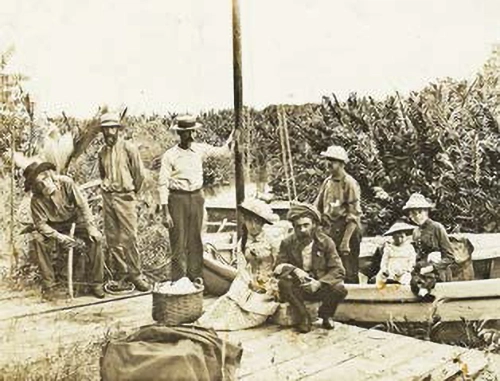
The Lainhart and Potter Families, including George Lainhart and George Potter (second and third from left) and Richard Potter (third from right)
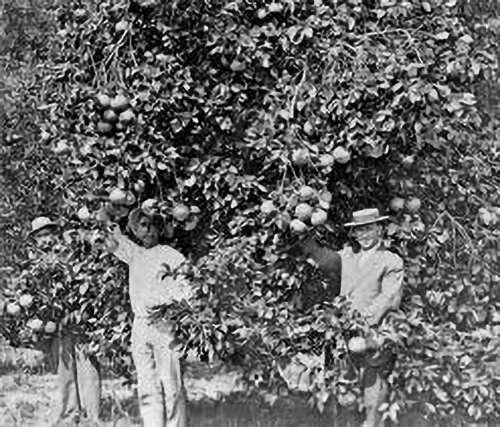
Visitors at Lainhart Groves, early 1900s. (Florida State Archives)
The passing of Dr. Potter in 1909 marked the beginning of a new chapter, as Potter Groves passed down to his brother, George. with his legacy passing to his brother George and intertwining with the destinies of Elisha N. Dimick and the Lainhart Groves. Together, they propelled the citrus industry forward, cementing the area’s citrus heritage.
Lainhart Groves, in particular, became renowned for its high-quality fruit, winning awards at the 1904 Louisiana Purchase Exposition in St. Louis, MO, and numerous county fairs, showcasing the premium quality of Jupiter Farms’ citrus on a national stage. The groves’ success attracted even Hollywood’s attention a half-century before Burt Reynolds would make moves in Jupiter, with scenes for the silent movie “Fog Bound” filmed at Lainhart Grove in 1923.
Hull Groves: A Vision of Expansion and Adversity
The story took a significant turn in 1919 when Robert H. Hull acquired the sprawling citrus operations, including the Potter and Brelsford Groves. By 1930, Hull expanded his holdings to a staggering 300 acres, with half under citrus cultivation. His forward-thinking approach extended to purchasing several groves near Indiantown, broadening the scope of Jupiter Farms’ citrus production.
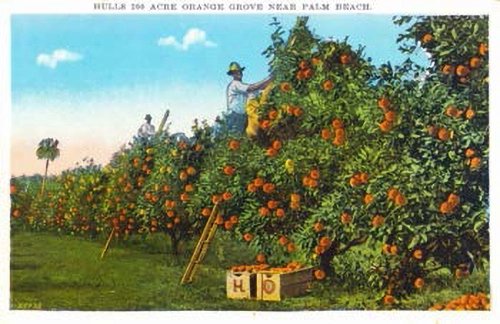
1920s postcard promoting Hull Groves
Hull’s tenure was marked by innovation and ambition, establishing the Jupiter Packing Company and transforming the groves and packing house into a local tourist attraction through aggressive advertising. However, the late 1920s brought devastating hurricanes, dealing a severe blow to Hull Groves, including the destruction of the packing house. Despite these challenges, Hull’s resilience shone through as he rebuilt, only to face the Great Depression and further hurricanes, ultimately leading to the relinquishment of his groves due to defaulted mortgages.
Chillingworth Groves: A Legacy of Experimentation and Tragedy
In 1938, Judge Curtis E. Chillingworth entered the scene, purchasing what remained of the Potter Groves. Curtis was a circuit court judge, frequent speculator in real estate, and resident of West Palm Beach. He operated the groves as a side business; experimenting with tropical fruit trees, and even hunting on the property.
His tenure, however, was overshadowed by his and his wife’s tragic kidnapping and murder in 1955, a crime that shocked the entire county. The perpetrators were hitmen hired by Joseph Peel, a corrupt judge Chillingworth was determined to disbar.
Transformative Beginnings: Jansik to Menser
The saga of Jupiter Farms’ citrus groves took a turn with Dr. Albin D. Jansik’s stewardship in the 1950s. After a fire devastated his cottage, leaving behind only a staircase and chimney- that remain as historical markers in western Riverbend Park- Jansik sold the groves to Clarence and Irene Menser. The Mensers, integrating into the community with their diverse experiences, marked a period of gradual transition, nurturing the citrus groves with a vision that extended beyond traditional agriculture.
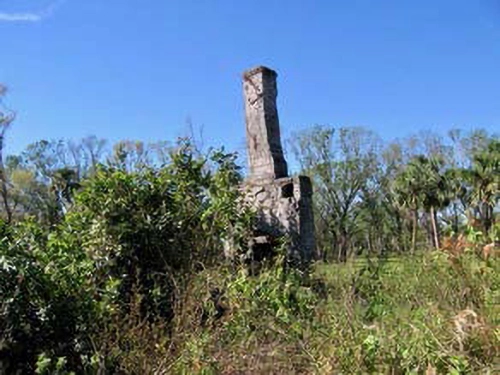
Ruins of the Jansik cottage in 2007. (LRHS Jim Schaaf Collection)
Welcoming the Community: Menser Groves' Open Invitation
Under the Mensers, the groves began to embody a spirit of openness and community engagement, a fact underscored by an advertisement for “The Menser Groves” which proudly proclaimed, “visitors always welcome.” This invitation reflected a broader vision for the groves, one that not only valued agricultural success but also community connection and shared experiences. The Mensers’ approach to running the groves represented early agritourism, inviting the public to witness the beauty and bounty of Jupiter Farms firsthand.
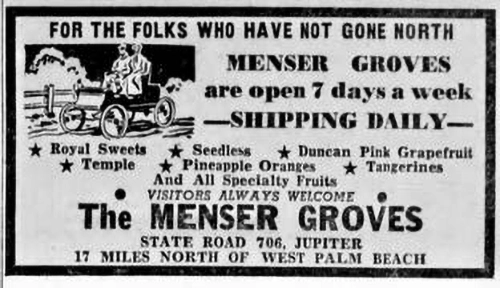
Menser Groves’ Palm Beach Post ad from 1956.
Legacy of Conservation and Community: The Reese Family
Following the Mensers, the Reese family further developed this ethos of community engagement and conservation. Claude Dimick Reese Sr. took over, implementing extensive improvements and diversifying the operations. Reese Ranch Groves emerged as a vibrant community hub, featuring attractions like a feed store, petting zoo, alligator farm, and tram tours. These initiatives invited even deeper community interaction, blending Jupiter Farms’ agricultural heritage with recreational and educational opportunities.
The Reese family’s efforts culminated in the sale of the property to the South Florida Water Management District in 1986, a testament to their dedication to conserving the land’s natural beauty and historical significance. This transition from commercial operations to conservation and public engagement marked a significant milestone in the evolution of Jupiter Farms’ citrus legacy.
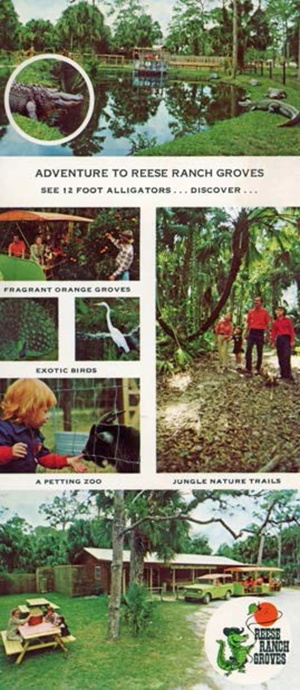
Reese Ranch Groves postcard
A Tapestry of Resilience and Community
From the pioneering days of Sawgrass Miller to the transformative initiatives of the Jansik, Menser, and Reese families, Jupiter Farms’ citrus groves have woven a rich tapestry of human resilience, innovation, and community spirit. Each era brought its own challenges and triumphs, but the enduring legacy is one of a deep connection between the land, its people, and the wider community. The open invitation to visitors from the Menser era and the diverse attractions of the Reese Ranch Groves symbolize a commitment to sharing the area’s agricultural heritage and natural beauty, ensuring that the citrus legacy of Jupiter Farms continues to thrive and inspire.
Modern Era and Preservation Efforts
As the 20th century progressed, the focus shifted from commercial citrus cultivation to conservation and preservation. The South Florida Water Management District’s acquisition of key lands signaled a commitment to safeguarding Jupiter Farms’ natural beauty and historical significance. This transition to conservation efforts led to the establishment of Riverbend Park, a testament to the region’s rich heritage and a beacon for environmental stewardship.
A Focus on Conservation and Recreation
The establishment of Riverbend Park and the Jupiter Inlet Lighthouse Outstanding Natural Area (ONA) highlights the community’s dedication to preserving its rich natural and historical resources. These areas serve not only as gateways to exploring the region’s diverse ecosystems and wildlife but also as living classrooms, educating visitors and residents alike about the importance of conservation.
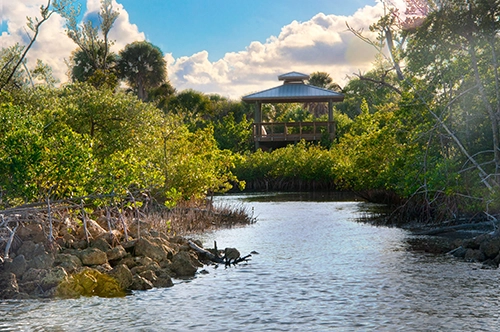
Riverbend Park, with its scenic trails, historic sites, and opportunities for kayaking, biking, and hiking, offers a glimpse into Florida’s past while providing a space for recreational activities that harmonize with the environment. Similarly, the Jupiter Inlet Lighthouse ONA (JILONA), a jewel in the crown of local conservation efforts, provides a sanctuary for wildlife and a venue for cultural and educational events, bridging the gap between past and present. The JILONA has long been considered a local treasure; the LRHS partnered with local governments, Congressional representatives, community members, and the Department of Interior’s Bureau of Land Management (BLM) to provide long range protection of this important slice of Florida wilderness.
Community Engagement and Environmental Awareness
The fabric of Jupiter Farms is woven with threads of community involvement and environmental consciousness. Events like the Wild & Scenic Film Festival at the Jupiter Inlet Lighthouse & Museum exemplify this spirit, bringing together individuals passionate about protecting our planet and celebrating the beauty of the natural world. This annual event not only showcases breathtaking films that inspire conservation efforts but also reinforces Jupiter’s role as a community committed to environmental stewardship.
As Jupiter looks to the future, it carries forward the legacy of its citrus past, not through orchards and groves but through its dedication to preserving the natural beauty that defines the region. This commitment ensures that the history, culture, and environment of Jupiter continue to be celebrated, protected, and cherished for generations to come.
Conclusion
Jupiter Farms’ story, from its early days as a citrus farming community to its current status as a model for conservation and environmental stewardship, is a story of transformation and resilience. As we celebrate this rich history through events like the Wild & Scenic Film Festival, we are reminded of the importance of our connection to the land and our role in preserving it for future generations.
Jupiter Farms stands as a testament to the power of community, the value of history, and the importance of the natural world. Its journey from citrus groves to conservation showcases the potential for harmonious coexistence with nature, inviting us all to engage, reflect, and act in the spirit of preservation and stewardship. This story is not just one of agriculture but of pioneers who dreamt, dared, and defined a community.
